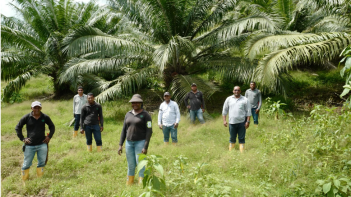A recent visit to a smallholder village in Riau, Indonesia reveals Shared Responsibility in action, with the synergy of three RSPO Certified Members APICAL, Asian Agri and KAO collaborating to improve smallholder livelihoods.
Businesses in a range of industries today are increasingly reliant on global supply chains to produce their goods and deliver commodities to their customers. A key feature of a globalised economy, these supply chains have created millions of new opportunities and ventures, which have helped lift millions of people out of extreme poverty.
One such collaboration is that of three RSPO Certified Members – processor and trader APICAL, grower Asian Agri and consumer goods manufacturer KAO. The joint venture between these three leading companies in the palm oil industry has committed to enhancing the lives of independent smallholders.
SMILE for smallholder inclusion
Smallholders are essential to the industry as they contribute to Indonesia’s total palm oil output. However, independent smallholders face significant challenges in order to grow oil palm while upholding strict sustainability criteria. In response, the three organisations joined forces in 2020 and launched the Smallholder Inclusion for Better Livelihood and Empowerment (SMILE) programme. A total of 3,018 independent smallholders, 390 of which are certified by the RSPO, have engaged with the Shared Responsibility framework.
A recent visit to a smallholder village cooperation (KUD) in Riau, Indonesia, revealed the spirit of Shared Responsibility at play as KAO committed to the purchase of all RSPO Credits produced by the KUD, while APICAL and Asian Agri focuses on getting the independent smallholders RSPO certified and onto the sustainable palm oil supply chain.
The programme plans to audit three new KUDs in 2023, with participation from approximately 1,105 independent smallholders in North Sumatra and Jambi. Tailored to help independent smallholders overcome barriers by lowering their cost of cultivation by at least 30% and increasing yield through access to knowledge, training and resources, the Certified Sustainable Palm Oil (CSPO) produced by participating independent smallholders will be sold at a premium, improving their income, livelihood and sustainability practices.
Aligning with RSPO roadmap
As a commitment to transform markets to make sustainable palm oil the norm, collaborations such as these are integral to practising Shared Responsibility, which requires the organisations involved to adopt a set of responsibilities that align with the RSPO roadmap, the Theory of Change.
A similar programme emulating this model of collaboration ran some years ago between RSPO members – NGO Solidaridad, consumer goods manufacturer Henkel and processor and trader, BASF. The project implemented a Farmer Field School where oil palm smallholders were trained on good agricultural practices as well as farm management according to sustainable social and environmental standards. Around 1,000 smallholders graduated from the school. In addition, the project provided education in financial literacy so that farmers can learn about responsible savings, spending, lending and investment.
Exemplifying sustainability leadership
Sustainability is a shared responsibility, and collaborations must be core to its achievement. As a key stakeholder, suppliers such as RSPO Certified Independent Smallholders, must be engaged to ensure that the value chain is sustainable from the start. Shared Responsibility helps determine which suppliers to engage with and provides tools to engage suppliers in areas related to sustainability.
For the RSPO, by implementing the Shared Responsibility requirements, members demonstrate sustainability leadership in each of their sectors. The Shared Responsibility Scorecard shows where organisations are in their sustainability journey based on RSPO’s Shared Responsibility Framework. Replicating the SMILE programme is possible with companies looking for other interested members on the RSPO Smallholder Engagement Platform (RSEP) to form their own collaborations towards smallholder inclusivity.
The SMILE programme is an ideal role model that shows how stakeholders are able to help balance the scales of sustainable palm oil production and sustainable palm oil consumption. To achieve this, downstream businesses like retailers, consumer goods manufacturers, processors and traders are expected to play major roles.
Furthermore, other RSPO Members, representing environmental and social NGOs, as well as banks and investors, could help create an ecosystem to support downstream businesses. It is crucial for stakeholders across various fields to actively affirm each other’s important work, while committing themselves fully to the cause.
Keep reading

Access into prisma

Updated Trace Function in prisma

Call for Expression of Interest: Independent Investigation of a Complaint

Latin American Smallholders, Key Global Brands Gather in Peruvian Amazon to Advance Sustainable Palm Oil

RSPO Forum for Members and Certification Bodies 2025: Strengthening Capacities and Building Bridges with RSPO Members

From Violence to Prosperity: Cultivating Sustainable Palm Oil in San Pablo, Colombia

Palmas de Tumaco: Enduring, Trusting, and Transforming in Colombia’s Pacific Coast
Carry Over Credits for Certified Independent Smallholder Groups




